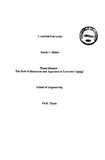JavaScript is disabled for your browser. Some features of this site may not work without it.
| dc.contributor.advisor | Muir, Helen | |
| dc.contributor.author | Quinn, Sarah L. | |
| dc.date.accessioned | 2013-03-01T09:59:11Z | |
| dc.date.available | 2013-03-01T09:59:11Z | |
| dc.date.issued | 2004-02 | |
| dc.identifier.uri | http://dspace.lib.cranfield.ac.uk/handle/1826/7839 | |
| dc.description.abstract | Using the Conservation of Resources model by Hobfoll (1989,1998) and the Cognitive- Appraisal theory by Lazarus and Folkman (1984) this research sought to understand what role resources and appraisal had in a participant's experience of loss and coping in Northamptonshire or Yorkshire due to being flood affected. Samples from two UK floods, the Easter 1998 and Autumn 2000 events, were selected and twenty-four in-depth interviews, one case study and two focus groups were conducted using a qualitative methodological approach and one semi-qualitative questionnaire was developed and distributed to 250 properties. The research aimed to establish which authors work was more appropriate towards understanding an individual's experience of flooding and any subsequent loss or was it better to combine the two. Then to understand if a single resource could contain both an objective and a subjective component that could be lost as a result of a flood. If this last aim was supported, then two further objectives were to be investigated; If a single resource contained dual components, did the objective or subjective element of the loss have the greater impact upon the individual. Finally, if a single resource contained dual components, how did the individual cope with loss of the objective element compared to loss of the subjective element? This research concluded that it was more appropriate to combine both theories to provide a comprehensive understanding of flooding. The five resources categories, object, condition, personal characteristic, energy and social support all demonstrated to varying degrees a duality of loss, in that one resource could have both an objective and subjective element that could be lost. Both types of loss had an impact but subjective losses appeared to affect participants longer. Participants used problem-solving, emotion-focused and disengagement-focused coping activities but there was a weak pattern of loss to coping employed. | en_UK |
| dc.language.iso | en | en_UK |
| dc.publisher | Cranfield University | en_UK |
| dc.rights | © Cranfeld University 2004. All rights reserved. No part of this publication may be reproduced without the written permission of the copyright owner. | en_UK |
| dc.title | Flood Disaster - The Role of Resources and Appraisal in Loss and Coping | en_UK |
| dc.type | Thesis or dissertation | en_UK |
| dc.type.qualificationlevel | Doctoral | en_UK |
| dc.type.qualificationname | PhD | en_UK |
